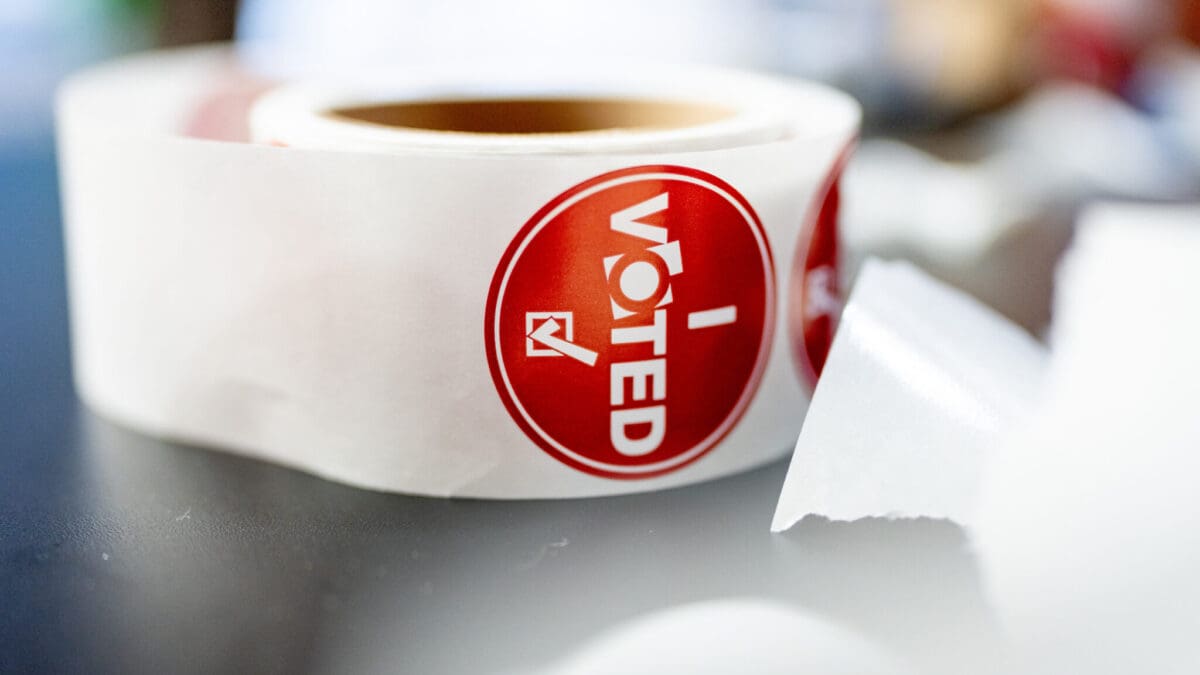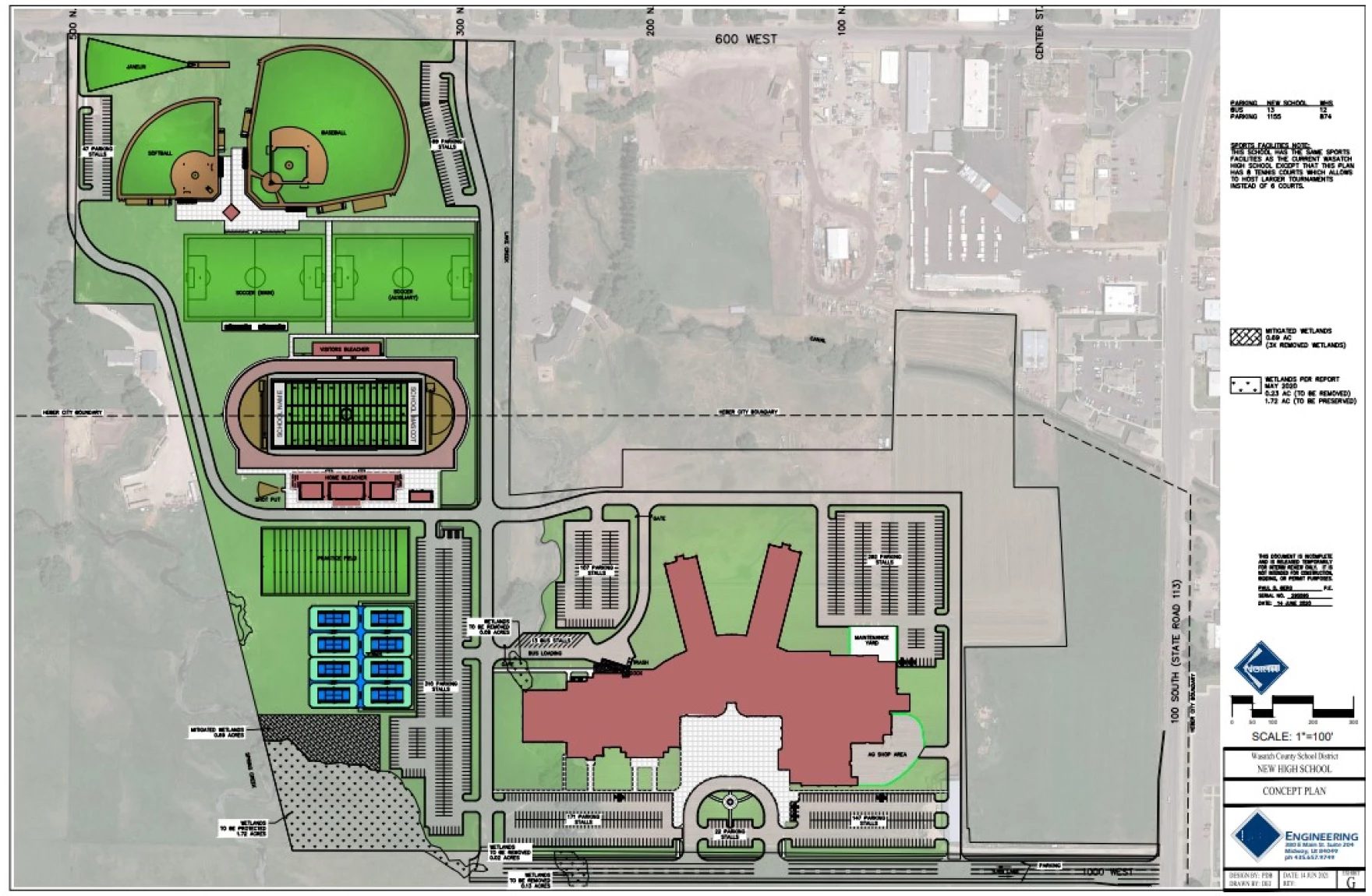Courts
Judge rejects lawsuit challenging Wasatch County school board candidate’s disqualification

An “I Voted” sticker is pictured at the Salt Lake County Government Center in Salt Lake City on Election Day, Tuesday, Nov. 5, 2024. Photo: Spenser Heaps for Utah News Dispatch
Wasatch County school board candidate Bradley Ehlert now poised to win after judge upholds disqualification of his opponent, Tom Stone, who was in the lead
By Katie McKellar, for Utah News Dispatch
A judge has rejected a lawsuit challenging the disqualification of a school board candidate in Wasatch County — a legal fight that had thrown that race in limbo for about a month, even though the rest of Utah’s election results have been certified for weeks.
After a more than two-hour hearing on Wednesday, 4th District Court Judge Shawn Howell said she would be siding with the Wasatch County county clerk and upholding her decision to disqualify a school board candidate, Tom Stone, after he missed his campaign disclosure deadline.
“As I’ve listened to this whole thing, the whole situation honestly, to me, is defined by human error,” Howell said before announcing her ruling, which she said was a legal conclusion based on what is — and isn’t — explicitly required from clerks in Utah’s election laws.
Stone filed his campaign disclosure report, due Oct. 29, two days late, on Oct. 31 — a fact that Stone’s attorney, Sen. Todd Weiler (who also serves as a legislator in the Utah Senate) did not dispute.
However, Wasatch County Clerk/Auditor Joey Granger didn’t initially inform Stone of any consequence, and the Nov. 5 election came and went. Stone — as far as he knew — thought he had won his race, with unofficial results showing he led his opponent, Bradley Ehlert, with 41.67% of the vote over Ehlert’s 38.61%.
It wasn’t until Nov. 14, nine days after the election, that Granger informed voters and Stone in a letter that he had been disqualified from the race because he failed to file the financial disclosure report on time, and that the county would “no longer count any votes for this candidate.”
That led Stone to sue, alleging the county clerk was “supposed to immediately notify” him and voters that he had been disqualified, rather than issue that notification more than a week after Election Day.
Granger, when questioned under oath during Wednesday’s hearing, said when she first received Stone’s late report on Oct. 31, she “flagged the email” and “put it in my reminders” before she “continued with my election duties.” She said she didn’t immediately disqualify him and notify voters because “it got lost in my to-do pile.”
It wasn’t until after she received a letter on Nov. 13 from the law firm Ballard Spahr informing her that three candidates, including Stone, had failed to file their campaign disclosures on time that Granger acted.
Stone’s attorney, Weiler, questioned why Granger had sent email reminders about campaign disclosure deadlines to other candidates but left Stone off that email list.
Granger, when questioned under oath by her attorney, Wasatch County Deputy Attorney Shelby Thurgood, said Stone was “inadvertently” omitted from that email list, which she said she created.
During his cross examination of Granger, Weiler also raised questions illustrating that this wasn’t the first time Stone had experienced issues with the Wasatch County clerk’s office. Last year, Weiler alleged someone in Granger’s office “manipulated and changed” Stone’s property tax appeal application to uncheck a box requesting an in-person hearing to argue against a 1,000% property tax increase.
When questioned about that incident, Stone said after he asked Granger multiple times to arrange a time for his appeal, he eventually was able to secure a time. After his presentation, he said Granger told him, “You probably should know something. The box was unmarked in my office by somebody.”
“I just put my hands in the air and said, ‘Look, I got my chance, thanks so much, I don’t want to go farther down that road,’” Stone said, adding that conversation happened in front of other Wasatch County officials and “that she admitted that someone in her office unmarked the box which would not have allowed me to come in and appeal my tax notice, which was a 1,000% increase.”
Granger, when questioned by Weiler, said she didn’t recall telling Stone that someone in her office had unchecked the box. Out of about 37,000 residents in Wasatch County, Weiler asked Granger “how is it possible that one of those 37,000 citizens would have your office mishandle his appeal, and then a year later leave him off of an email list.”
“He must be the unluckiest person in the world, or at least in Wasatch County, would you agree?” Weiler said. Granger’s attorney objected on the basis that the question was argumentative, leading Weiler to withdraw it.
Ultimately, Weiler argued that because Granger didn’t disqualify Stone until nine days after the election, it was “too late” because she let voters cast their votes for him not knowing he would be disqualified.
“If the court allows this to stand, I think it undermines the confidence of the electorate,” Weiler argued. “We cannot allow our election officials to act so unilaterally to pull the carpet underneath the candidate who won and the voters who voted for him.”
Thurgood, however, argued that there are no explicit requirements within Utah law setting a deadline for clerks to disqualify candidates — and that the statute is clear that if candidates miss their campaign finance disclosure deadlines, they’re disqualified.
“That failure alone,” Thurgood argued, “is enough for the court to deny the petition.”
Thurgood also argued it would be “unfair” to other candidates to provide an exception to Stone and allow him to “disregard the rules with no consequences.”
The judge agreed that Stone’s late filing clearly disqualified him — and also that Utah law sets “no timeframe” for clerks to inform a candidate they’ve been disqualified. Reminders, she also noted, are “a courtesy,” and that clerks don’t necessarily need to remind candidates about the deadlines.
When candidates sign their candidate declarations they initial a box saying they’re aware of the requirements and deadlines for campaign finance disclosure reports.
Howell also said Weiler’s argument that letting the clerk’s decision to disqualify Stone stand would undermine elections is “misplaced,” adding that Granger did ultimately comply with Utah law.
“Human error was on parade here,” the judge said, though she added she’s “not blaming anyone. But I cannot come to any other legal conclusion based on the language of the statute.”
After the hearing, Weiler told Utah News Dispatch he would need to consult with Stone before he could say whether they’d be filing an appeal with the Utah Supreme Court.
Based on the judge’s decision, Wasatch County officials are now expected to certify the race’s results with Stone disqualified and Ehlert as the victor.
However, the matter of whether clerks should have more explicit requirements to notify candidates in a timely manner when they’ve been disqualified may surface during the Utah Legislature’s 2025 general session, scheduled to begin Jan. 21.
Weiler said he typically doesn’t “try to take my clients’ losses in court” and “run a bunch of a bills as a result of that,” but he said he expects several bills related to Utah’s election system to come up during the session, and “I might ask a sponsor to look into an amendment.”
“That’s worth some discussion,” he said.


















